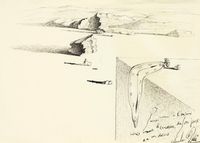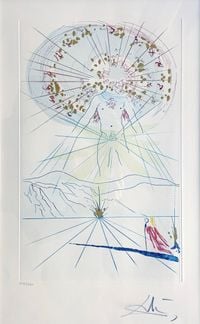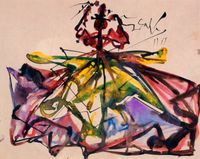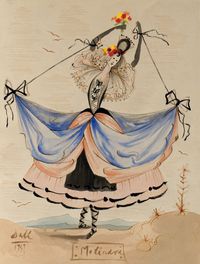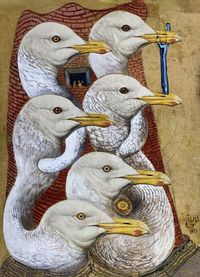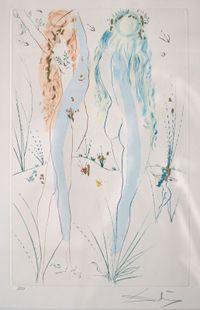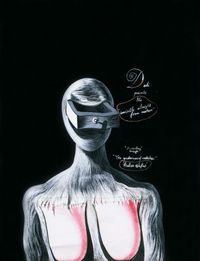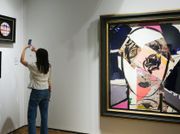One of the most well-known artists of the 20th century, Salvador Dalí is especially recognised for his Surrealist paintings, sculptures, and films exploring the unconscious mind.
Read MoreBorn and raised in Figueres, Spain, Salvador Dalí enrolled at Madrid's Real Academia de Bellas Artes de San Fernando in 1921 to study art. He participated in exhibitions at the academy early on, winning the University Vice-Chancellor's prize in 1922 for his work Market in the Students' Original Art Works Competition Exhibition of the Catalan Students' Association. The exhibition was held at Galeries Dalmau, Barcelona, where Dalí also presented his first solo show in 1925.
It was in Madrid that Dalí met his longtime friends, collaborators, and fellow avantgardes, including the filmmaker Luis Buñuel, poets Federica García Lorca and Pedro Garfias, and writer Pepín Bello. In 1925, Dalí continued to exhibit in Madrid and Barcelona without returning to school; in the following year he was expelled from the academy.
For Dalí and his contemporaries, and as it had been for several generations before them, Paris was the cultural destination for artists. Dalí first traveled to the city in 1926, where he met Pablo Picasso, and returned there three years later. There, he befriended Joan Miró, who introduced Dalí to the Surrealist group led by art critic and poet André Breton.
Fascinated with the Surrealists' drive to unleash the unconscious through automatic drawing and writing, Dalí began to experiment with the uncanny and irrational in works such as Un Chien Andalou (1929), a 17-minute film made in collaboration with Buñuel that includes the now famous scene of a man cutting across a woman's eye with a razor. The duo also worked on the film L'Age d'Or (The Age of Gold) (1930), a Surrealist satire about modern bourgeois society.
The Persistence of Memory (1931) is arguably Dalí's most known work as well as one of the most famous Surrealist paintings. It depicts his melting clocks, which appear to have turned into soft objects of flesh that attract insects. Dalí also created what he called 'Surrealist objects' by juxtaposing found objects in a sculptural collage, such as Mae West Lips Sofa (1936), a sofa in the shape of a pair of feminine lips, and Lobster Telephone (1938), in which the artist combined two objects that held strong sexual undertones for him.
Dalí soon received international attention for his Surrealist works, showing them in 1931 at the first exhibition of Surrealist art in the United States at the Wadsworth Atheneum in Hartford, Connecticut. His solo exhibitions in Paris and New York followed in 1933, as did the inclusion of his work in the group shows The International Surrealist Exhibition at New Burlington Galleries, London and Fantastic Art Dada Surrealism at the Museum of Modern Art, New York in 1936.
Despite Dalí's ongoing association with Surrealism, the artist broke with the Surrealists in 1939, who were increasingly critical of what they perceived as the commercialisation of Dalí's work. However, Dalí continued to engage with Surrealist ideas and imagery, as can be seen in The Elephants (1948), in which the two animals—traditionally, symbols of strength and power—rely on impossibly thin and spider-like legs against a reddening sky.
In 1940, upon the advance of German troops, Dalí and his wife Gala left Europe for the U.S. While continuing to exhibit and work across other disciplines, Dalí was influenced by the nuclear bombs of 1945 to explore mystical and scientific motifs in his creations. Madonna of Port Lligat (First Version) (1949), for example, shows Gala as the Madonna, seated in a throne that hovers above water.
Dalí and Gala moved to Port Lligat, a village in Spain, in 1948, and divided their time between Paris and New York until Dalí's death in 1989.
Writing was a consistent practice for Dalí, who published his first articles in the Studium magazine that he had founded with friends in 1919. Between 1927 and 1929, the artist contributed regularly to the journal L'Amic de les Arts. In the following years he published books about art, screenplays, and manifestos including L'amour et la mémoire (Love and Memory) (1931); Babaouo (1932); La conquête de l'irrationnel (The Conquest of the Irrational) (1935); Le mythe tragique de "L'Angélus" de Millet (The Tragic Legend of The Angelus by Millet) (1963), as well as his part-factual and part-fictionalised autobiography, The Secret Life of Salvador Dalí (1942).
Dalí was also involved in the ballet and film industries, designing sets for Bacchanale (1939) and El Café de Chinitas (1944), among others. While living in the U.S., the artist assisted in the productions of Alfred Hitchcock's Spellbound (1945) and Walt Disney's incomplete Destino (1946), which was later released in 2003. Dalí was also cast for Alejandro Jodorowsky's film adaptation of the sci-fi novel Dune, although the project was never realised.
Salvador Dalí was an internationally established artist in his lifetime. His work was the subject of numerous major retrospective exhibitions, including Salvador Deli: Rétrospective 1920—1980, Centre Pompidou, Paris (1979); Salvador Dalí, Tate, London (1980); 400 works by Salvador Dalí from 1914 to 1983, Museo de Arte Moderno, Madrid (1983), which also travelled to Barcelona and Figueres; and Salvador Dalí, 1904—1989, Staatsgalerie, Stuttgart and Kunsthaus Zurich (1989).
Dalí received the highest Spanish distinction, the Gran Cruz de Isabela la Católica, in 1964. Following his death in 1989, the artist was buried at the Dalí Theatre-Museum in Figueres. The Dalí Museum, another museum dedicated to him, is located in St. Petersburg, Florida.
More recent solo exhibitions of Dalí's work include Salvador Dalí: Magic Art, Fabergé Museum, St. Petersburg, Russia (2021), and Salvador Dalí, Apprentice Painter, Dalí Theatre-Museum, Figueres (2018).
In 2021 alone, Dalí's work was featured in group exhibitions Surrealism Beyond Borders, The Metropolitan Museum of Art, New York; Surrealistic Creatures, Max Ernst Museum Brühl des LVR, Germany; The Flames, Musée d'Art Moderne de Paris; and Surrealist Art: Masterpieces from Museum Boijmans Van Beuningen, Museum of New Zealand Te Papa Tongarewa, among others.
Sherry Paik | Ocula | 2021
